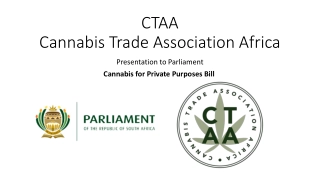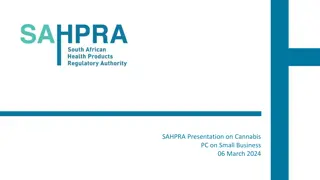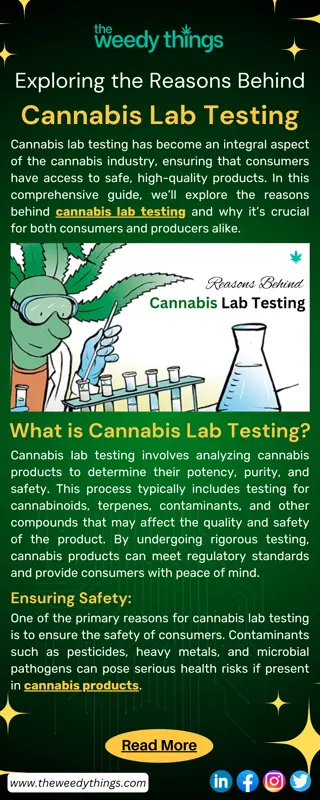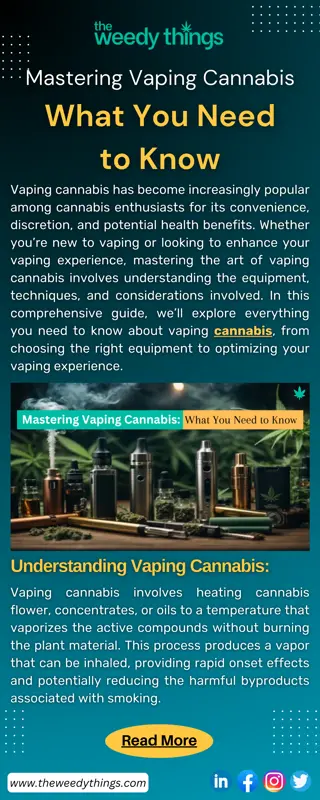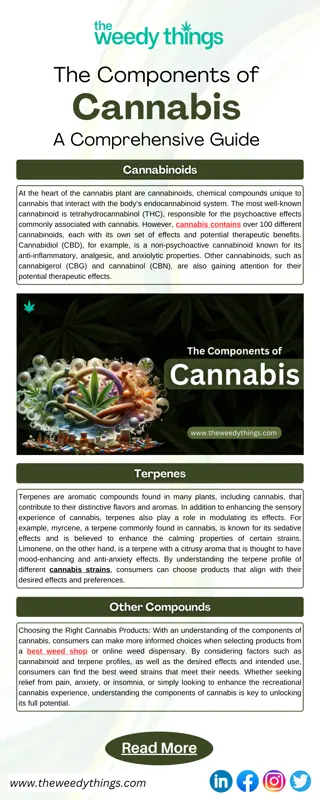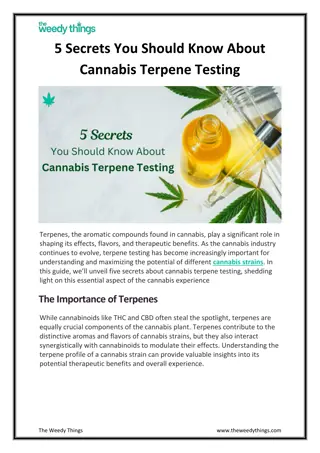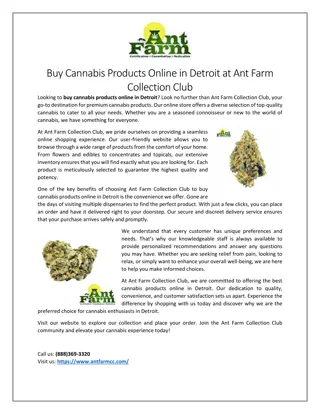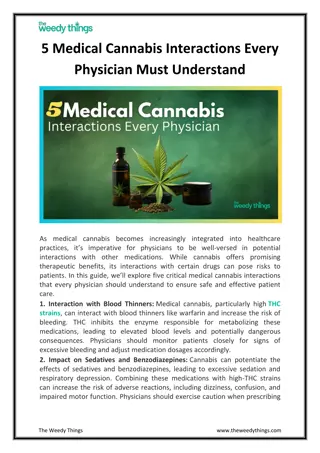
The Cannabis Conundrum and Legal Implications in the United States
Explore the complex landscape of cannabis legalization in the United States, including its economic impact, legal challenges, and federal regulations. Learn about the shifting laws, challenges faced by businesses, and the conflicting state and federal regulations in the cannabis industry.
Download Presentation

Please find below an Image/Link to download the presentation.
The content on the website is provided AS IS for your information and personal use only. It may not be sold, licensed, or shared on other websites without obtaining consent from the author. If you encounter any issues during the download, it is possible that the publisher has removed the file from their server.
You are allowed to download the files provided on this website for personal or commercial use, subject to the condition that they are used lawfully. All files are the property of their respective owners.
The content on the website is provided AS IS for your information and personal use only. It may not be sold, licensed, or shared on other websites without obtaining consent from the author.
E N D
Presentation Transcript
The Cannabis Conundrum James L. Day, Bush Kornfeld, Seattle Keri L. Riley, Kutner Brinen, Denver John M. Hickey, Hall Estill, Tulsa Hon. Elizabeth E. Brown, Denver, Moderator
Cannabis is Big Business Cannabis is Big Business Per the US Census data for 2018 Oklahoma s population was 3,943,000 Per the Oklahoma Medical Marijuana Authority on 7/29/18 there had been issued 170,404 patient licenses 3,733 grow licenses 1,708 dispensary licenses 984 processor licenses Total 6,425 MMJ businesses were started since September of 2018
Who Loves Who Loves You, Baby? You, Baby? Recreational marijuana is currently legal in 11 states and the District of Columbia Washington: I-502 passed in November 2012 by a 56 44% margin. Medical marijuana legal in another 20 states Wholly illegal in 19 states Projected Revenues: Washington State: $730 million for 2017-19 budget cycle Excise tax rate: 37% on retail sales
Not the Feds: Not the Feds: Controlled Substances Act Controlled Substances Act Marijuana classified as a Schedule I Drug, which the statute defines as: [H]igh potential for abuse [N]o currently accepted medical use in treatment in the United States [L]ack of accepted safety for use of the drug or other substance under medical supervision Included with LSD, Heroin, and Ecstasy
Changing of the Guard United States Trustee Directive of April 26, 2017: Trustees must move to dismiss or object whenever marijuana assets are involved because they may not be administered under the Bankruptcy Code
The Rule The Rule of Law of Law Sessions Memorandum, January 4, 2018: Announcing a return to the rule of law Directs all US Attorneys to enforce the laws enacted by Congress
Clifford J. White III, Director of the U.S. Trustee Program, Clifford J. White, told a congressional subcommittee that debtors with assets or income derived from marijuana may not proceed through the bankruptcy system. Since 2010 the US Trustee Program filed 88 enforcement actions against marijuana or marijuana related businesses. In 2015 and 2016 there were 20 actions filed. In 2017 there were 29 and in 2018 there were 24.
DOJ: Cole Memorandum August 29, 2013: Directing USAOs to direct prosecutorial focus elsewhere in states with robust legalization framework Congress: Rohrabacher- Farr Amendment: Blocks DOJ funding for prosecutions in states having legalized medical marijuana (every appropriations bill since Sept 2014) UST: only federal agency seeking to prosecute in states with comprehensive legalization schemes
The Hypocrisy Continues: The Hypocrisy Continues: IRS: Billions of dollars of revenue collected 26 USC 280E: No deductions for business expenses (higher effective rate) Supreme Court: Nebraska v. Colorado, 577 US ___, 144 Orig (March 21, 2016) Denying motion for leave to file complaint US Constitution, Article III, Section 2 and 28 USC 1251(a): original jurisdiction DEA: No wholesale enforcement actions
What Exactly is Prohibited? What Exactly is Prohibited? Sections 843, 856, and 863 Maintaining a drug-involved premises Selling drug-related paraphernalia Equipment used in manufacturing CS Using interstate commerce to transport Section 841 Knowingly or intentionally Manufacturing, distributing, dispensing, and possessing a controlled substance (CS) or Creating, distributing, or dispensing a counterfeit substance
Bankruptcy Bankruptcy Courts Courts Enforce the Enforce the Law Law
In re Rent In re Rent- - Rite Super Rite Super Kegs W. Ltd Kegs W. Ltd., 484 B.R. 799, 803-04 (Bankr. D. Colo. 2012)
Arenas v. United States Trustee (In re Arenas) Arenas v. United States Trustee (In re Arenas), , 535 B.R. 845, 851 (10th Cir. B.A.P. 2015) 535 B.R. 845, 851 (10th Cir. B.A.P. 2015) Chapter 7 Dismissal Chapter 13 Conversion Futile Abandonment of Illegal Assets Discussed: A Possible Cure for Some?
Direct Connections vs. Indirect Ties to MJ Biz In re Medpoint Mgmt In re Way to Grow, Inc.
How Far Do We Go? Equipment lessors Apartment building owners Retailers Service providers: plumbers, yard service, contractors Restaurants Employment agency that supplies workers
Garvin v. Cook Garvin v. Cook Investments NW, 922 Investments NW, 922 F.3d 1030 (9 F.3d 1030 (9th th Cir. 2019) 2019) Cir. UST Motion to Dismiss for Cause: Gross Mismanagement of the Estate per 1112(b)(4)(B) Lease Rejection Joint Plan UST Objection: 1129(a)(3)
The Plan has been proposed in good faith and Sole Issue: Sole Issue: Section Section 1129(a)(3) 1129(a)(3) Not by any means forbidden by law
So, what happened next? So, what happened next?
In re Cook Investments In re Cook Investments Takeaways Takeaways Ninth Circuit only for now Eliminates basis for objecting to plan confirmation based on substantive content May reflect a more appellate openness to regarding marijuana companies and access to bankruptcy relief Ruling narrow: Court did not address tension between bankruptcy relief and CSA Likely only helpful for chapter 11 debtor that has survived motion to dismiss Plan did not rely on marijuana assets or income lease had been rejected
If Contrary Interpretation of 1129(a)(3) Adopted, If Contrary Interpretation of 1129(a)(3) Adopted, What Implications for other Violations of Federal What Implications for other Violations of Federal Law? Law? Widget manufacturer: Outstanding OSHA violations Chain of auto repair shops or dry cleaners: Outstanding EPA violations Trucking firm: Outstanding NHTSA safety violations; half of fleet violating emission standards Any business: Unpaid federal income and withholding taxes
Cannabis is a genus of flowering plants, which consists of two primary species: Cannabis sativa and Cannabis indica. Within these two categories are hundreds of different strains While hemp and marijuana are regularly referred to as Cannabis, they actually very distinct. Hemp is Cannabis that contains THC delta 9 of less than 0.3% content by dry weight. Cannabis, Cannabis, Hemp, and Hemp, and Hemp products Hemp products
Legislative Background Legislative Background The 2014 Farm Bill: allowed the cultivation of hemp on a state by state basis through pilot programs administered by universities under the auspices of the state agricultural departments The 2018 Farm Bill: legalized the commercial production of hemp and removed it from the Controlled Substances Act as long as it met the definition of hemp
It is now legal to buy and sell hemp and hemp products in interstate commerce The 2018 Farm Bill was designed to make the cultivation and processing of hemp legal just like any other farming operation
Regulatory Guidance Regulatory Guidance There is currently very little regulatory guidance for hemp There is currently very little regulatory guidance for hemp farmers as the USDA has been slow to promulgate rules. Federal farmers as the USDA has been slow to promulgate rules. Federal regulations are anticipated to be published in August regulations are anticipated to be published in August The states are all waiting on the USDA to do their job before The states are all waiting on the USDA to do their job before developing state plans developing state plans Consequently, the current hemp growers are operating under the Consequently, the current hemp growers are operating under the old rules established by the 2014 Farm Bill under pilot programs old rules established by the 2014 Farm Bill under pilot programs
A Cash Cow: A Cash Cow: Hemp Hemp Highly Lucrative: 160 acres of hemp = $10,000,000 Many Products Made from Hemp: beer, milk, shoes, protein powder, tea, coffee, hamburgers, rope, clothes, yoga pants, sunglass frames, soap, concrete, automobiles and pens, just to name a few
Acceptance of Hemp Acceptance of Hemp Businesses Businesses Banks: reluctant but changing regarding opening accounts and lending. The federal government is working to develop federally backed loans to hemp farmers IRS: still uncertainty over whether they will treat hemp biz similarly to marijuana and only allow deductions for cost of goods sold (IRC Section 280 (e)) The 2018 Farm Bill allows for crop insurance but it will likely take years to develop because of uncertainty over yields and exceptions for destruction of crops at the direction of a regulatory body 26
What is a Hot Plant? What is a Hot Plant?
Is Chapter 12 Relief Available for Is Chapter 12 Relief Available for Hemp Farmers? Presumably so, but Hemp Farmers? Presumably so, but Some of these businesses sell the THC which has been processed out of the biomass, which would be illegal under federal law Then there is the problem of whether a Chapter 12 debtor does not properly dispose of the hemp if any of the plant or biomass is hot i.e. more then .3% THC? Does this expose the Trustee to liability? Some states currently require a farmer, where there are a handful of hot plants, to cut down and dispose of the entire crop. What kind of impact would that have on a Chapter 12 plan?
The The Receivership Receivership Option: Option: All states have some form of a statutory scheme for receiverships But when it comes to receiverships for cannabis businesses its not always easy to have a receiver appointed Colorado Allows receivers to be appointed to take over an run a marijuana business but they have to licensed by the State s regulatory body for overseeing marijuana. Yates v Hartman, 2018 COA 31, (Colo. App. 2018). They need an Occupational Key license for $250.
Colorado Licensing Requirements are difficult to Colorado Licensing Requirements are difficult to navigate and expensive, for example navigate and expensive, for example A retail marijuana cultivation facility license may be A retail marijuana cultivation facility license may be issued only to a person who cultivates retail marijuana issued only to a person who cultivates retail marijuana for sale and distribution to licensed retail marijuana for sale and distribution to licensed retail marijuana stores, retail marijuana products manufacturing stores, retail marijuana products manufacturing licensees, or other retail marijuana cultivation facilities. licensees, or other retail marijuana cultivation facilities. (Colorado Retail Marijuana Code 14 (Colorado Retail Marijuana Code 14- -12 12- -403). 403). The application fee alone is $5000 and there are local The application fee alone is $5000 and there are local jurisdiction fees on top of this. (CRMC 14 jurisdiction fees on top of this. (CRMC 14- -12 12- -501) 501) 30
Receiverships for a Cannabis Receiverships for a Cannabis Business Business Oregon Has adopted regulations which allow for the receiver to be appointed as long as the receiver meets some very simple standards. Proof that the person is the legal trustee, receiver for the business; and A written request for authority to operate as a trustee or receiver, listing the address and telephone number of the trustee, receiver or personal representative. 31
Oklahoma SB 532 Oklahoma SB 532 Andy Turner, a colleague of mine in Tulsa, drafted legislation for the appointment of a receiver for the purpose of making it simpler to have a receiver appointed for a medical marijuana business. Codified as 12 O.S. Section 1560, the new law allows creditors of a medical marijuana business to have a receiver appointed to run the business during the pendency of the receivership, whether it is a dispensary, grow operation, or extraction company. 32
Disadvantages of a Receivership Disadvantages of a Receivership *A receiver is often looking out for the best interest of the creditors that have selected him and not the debtor *State receivership laws are not as well developed, creating uncertainty *Many state court judges are unfamiliar with marijuana businesses *And its expensive, anywhere from $10,000 a month to $40,000 a month for more complex cases
Questions? Questions? Comments? Comments?

